This post contains affiliate links.
Chemistry board games are a unique and effective tool for exploring chemistry in a fun and engaging way. This list aims to provide you with a list of board games that can really help students (and sometimes families) learn about chemistry.
There are ten chemistry-related available board games on the market, (plus many printable games). Most are intended for a classroom environment as a means of reviewing content, but all of them are fun and help players to learn chemistry accurately. React! is the most advanced game knowledge-wise and is meant for college students. Covalence is an extremely versatile and accurate game suitable for both families and schools, while Chemistry Mastery Game is a comprehensive review game for high school.
Chemistry Board Games Comparison Table
The games below are all great to begin having fun with all concepts related to chemistry. To help you in picking out just the right game you can use the table below to compare the different games that are available.
| Game | Age | Players | For | Price | Rating |
|---|---|---|---|---|---|
| Compounded | 13‑15 | 2‑5 | Families | $$$ | ★★★★☆ |
| Covalence | 8+ | 2‑4+ | Schools Families | $$$ | ★★★★★ |
| Escape Evil | 10+ | 2‑4 | Families | $$$ | ★★★☆☆ |
| React! | 17+ | 2‑4 | Colleges | $$$ | ★★★★☆ |
| Chemical Compounds | 13‑17 | 2‑8 | Schools | $$$ | ★★★★★ |
| Lab Cabinet | 14‑17 | 2‑6 | Schools | $$$ | ★★★★☆ |
| Acids and Their Salts | 13‑17 | 2‑8 | Schools | $$$ | ★★★☆☆ |
| Mendeleyev’s Dream | 12‑14 | 2‑6 | Schools | $$$ | ★★★☆☆ |
| Chemistry Mastery Game | 14‑18 | 2-36 | Schools | $$$$ | ★★★★★ |
| CompoundIt! | 12+ | 2-6 | Families | $$$ | ★★★★☆ |
Remark: The column “Age” is the Recommended age (by the publisher) and the Price is an approximate price.
Top 10 Chemistry Board Games
Compounded (Dice Hate Me Games)
★★★★☆
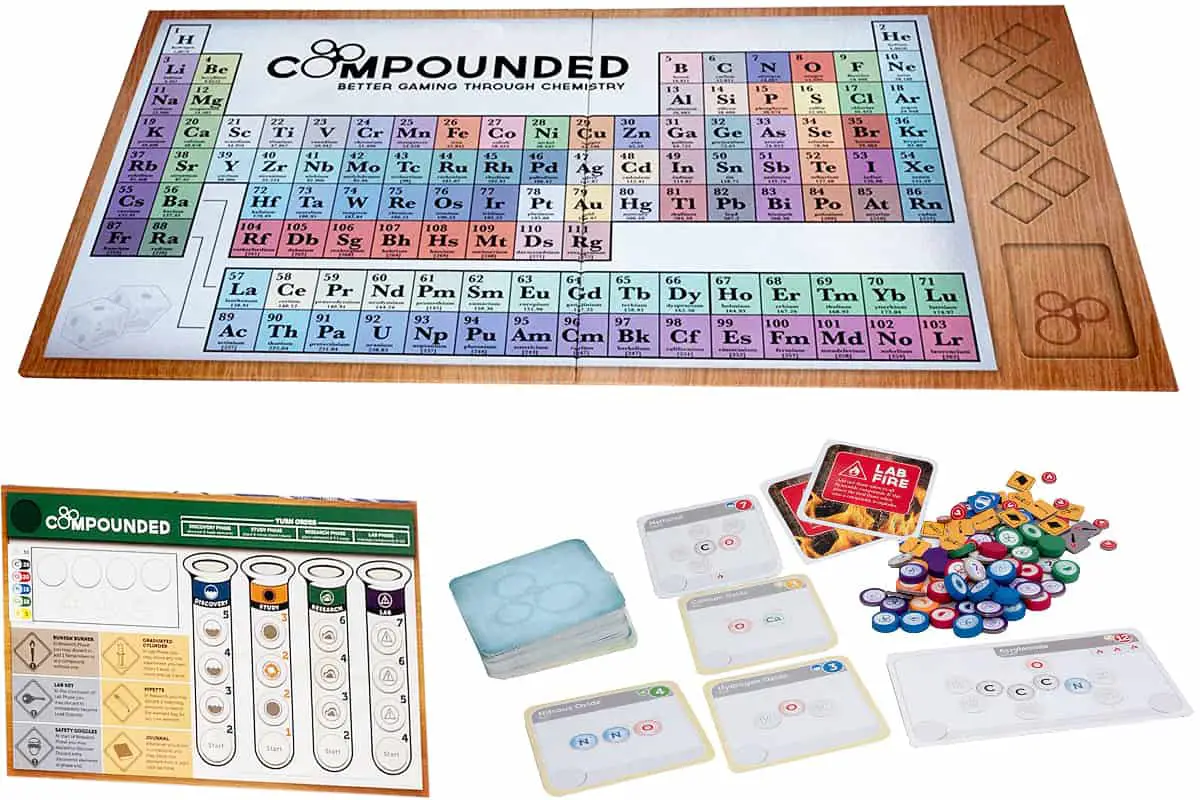
2-5 Players | Age 13-15 | For Families
Compounded is a fun game that is based heavily on strategy. Players must manage their resources, which are in the form of chemical elements, to create compounds. This game is a trading style, social, game with players being delegated the roles of lab managers attempting to build the most compounds before their competitors or before an explosion!
is a fun game that is based heavily on strategy. Players must manage their resources, which are in the form of chemical elements, to create compounds. This game is a trading style, social, game with players being delegated the roles of lab managers attempting to build the most compounds before their competitors or before an explosion!
Although “Compounded” is undoubtedly fun, it is a bit lighter on the chemistry knowledge. However, as an introduction to the content or as a fun game for the science-driven person Compounded hits the spot. Although the game is recommended for teens many adults will also enjoy playing the game, making it great for a family.
Game times run around 2 hours so it is not suitable for younger players. One of the main struggles is an initial hurdle with the directions. They are very complicated! However, there is a tutorial found here that makes it easier to understand.
that makes it easier to understand.
Covalence (Genius Games)
★★★★★
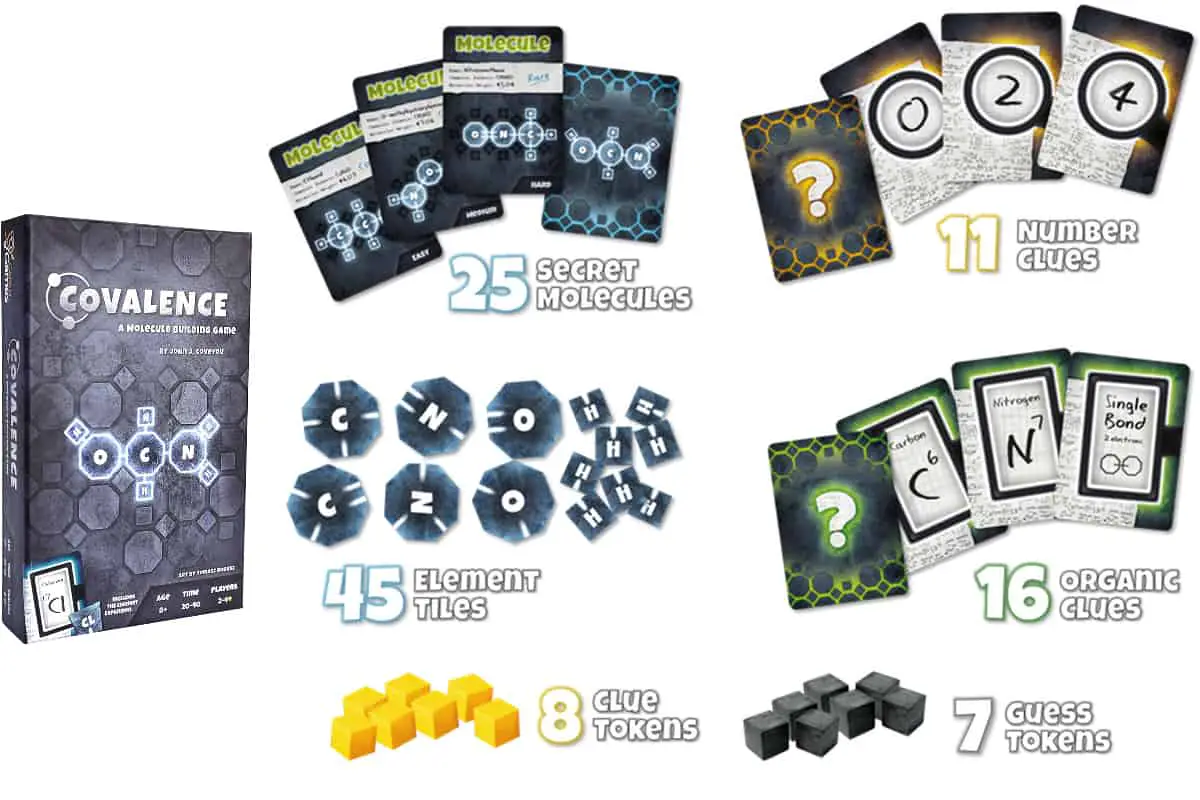
2-4+ Players | Age 8+ | For Schools & Families
The premise of Covalence: A Molecule Building Game is simple, players must build organic molecules from the elements on the periodic table. This can involve in-depth strategy, making this game appropriate for adults, but it is also straightforward enough for players as young as 8. Covalence is cooperative in nature so kids can have fun working with one another rather than against.
is simple, players must build organic molecules from the elements on the periodic table. This can involve in-depth strategy, making this game appropriate for adults, but it is also straightforward enough for players as young as 8. Covalence is cooperative in nature so kids can have fun working with one another rather than against.
One of the best things about Covalence is that the science is highly accurate. This means the game is suitable as a study guide or to help a student actually understand the science behind the bonding. It is a fun way to build background knowledge on molecules and bonding.
Covalence lasts between 20-40 minutes which could lend to being very useful for a middle school or high school science teacher. When students finish something early or just as an introduction to chemistry, they could play the game in a small group.
Escape Evil (Kitki)
★★★☆☆
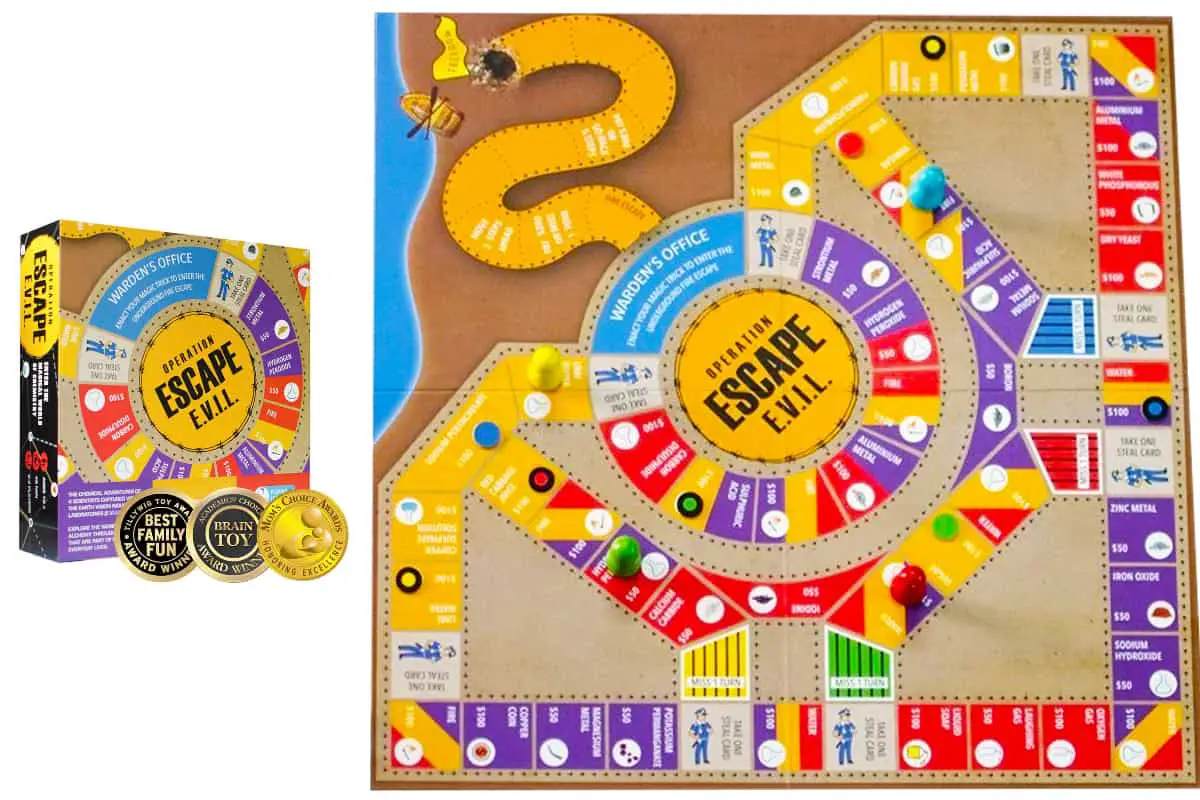
2-4 Players | Age 10+ | For Families
Escape Evil has won many awards and it is with good reason. In the game, players take on the role of imprisoned scientists who must escape using 1 of 16 magic tricks. These tricks are based in chemistry and the game is designed to be played more than one time.
has won many awards and it is with good reason. In the game, players take on the role of imprisoned scientists who must escape using 1 of 16 magic tricks. These tricks are based in chemistry and the game is designed to be played more than one time.
This game is best used by beginners as there is no chemistry knowledge needed to begin playing. Gameplay lasts approximately 45 minutes, although if you are having fun it may take longer as you play again and again.
The fun part about Escape Evil is that each of the 16 “tricks” can actually be performed in real life if you can get your hands on some basic chemicals. While the game is recommended for 10 and up it has a sweet spot of between 11-13 where kids seem to really enjoy it. Beyond that, it may be too easy for a chemistry enthusiast!
React! (ResEd)
★★★★☆
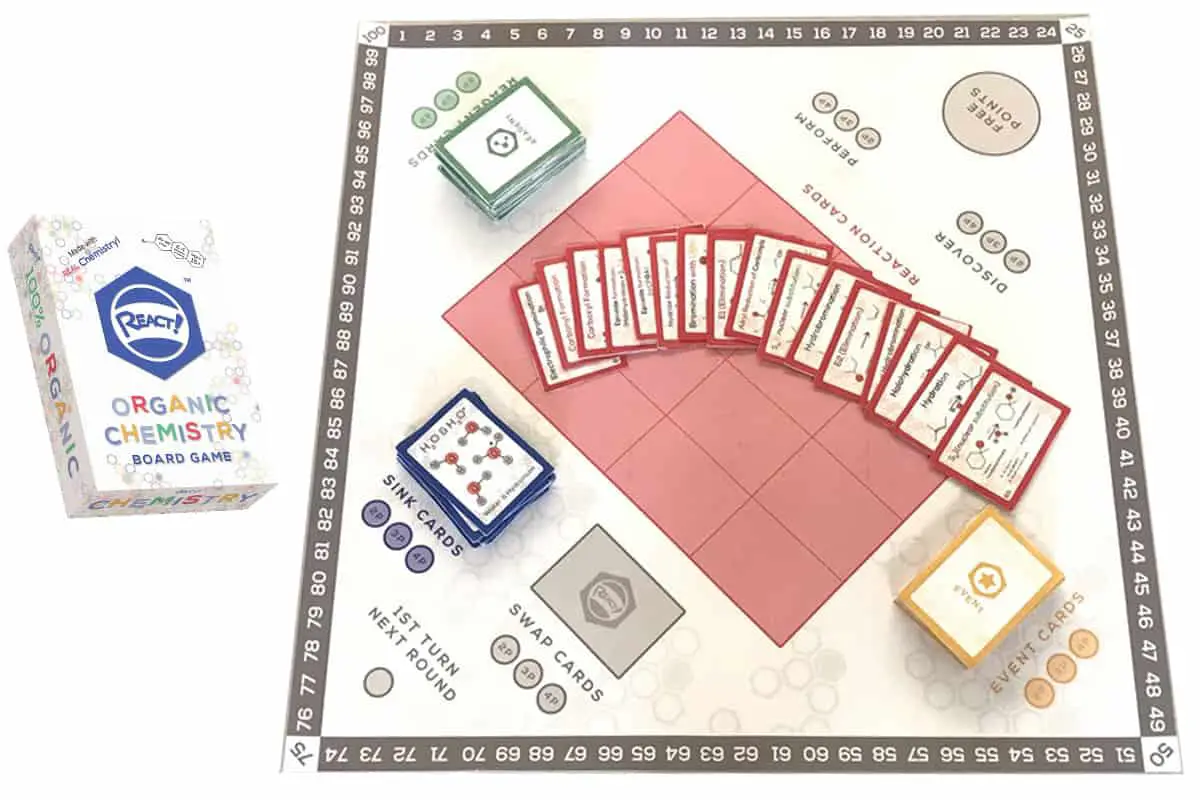
2-4 Players | Age 17+ | For Colleges
React ! is easily the most challenging and advanced game on this list both in terms of gameplay, and chemistry concepts. It was created by students at the University of California Berkeley who wanted to share their love of chemistry with the world. React! is designed to cover the material in the first semester of college-level organic chemistry.
! is easily the most challenging and advanced game on this list both in terms of gameplay, and chemistry concepts. It was created by students at the University of California Berkeley who wanted to share their love of chemistry with the world. React! is designed to cover the material in the first semester of college-level organic chemistry.
Here is a a video of how to play React!:
The game is complex, truly for people who love chemistry. The claim that no prior knowledge is required to play the game is exaggerated. Although recommended for players 15 years and older I have a hard time seeing the average 15-year-old enjoying this game, I would recommend this game for chemistry students ages 17 and up.
React! has 3 levels of difficulty to match the player skill and ability. The gameplay should take anywhere from 20-60 minutes depending on the difficulty level.
If you plan to use the game as a real study tool (for the MCAT for example like some customers report they do) this is the game you need!
Chemical Compounds (I’M)
★★★★★
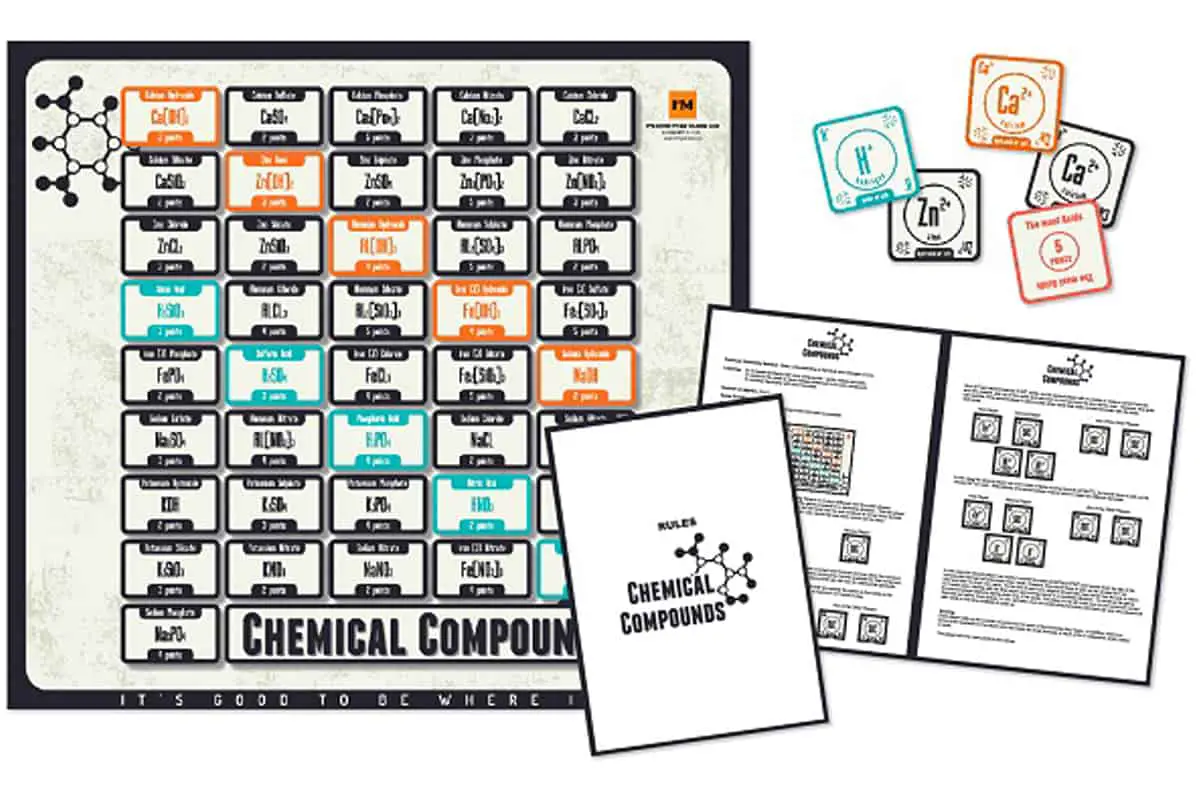
2-8 Players | Age 13-17 | For Schools
Chemical Compounds is a game that is designed to help students, specifically, to better understand chemistry in the following areas:
is a game that is designed to help students, specifically, to better understand chemistry in the following areas:
- Acids, Bases & Salts
- Ionic Formulas & Balance
This game is simple, yet very effective for high school students in chemistry. Essentially students are dealt with cards with different ions and their task is to develop as many compounds as possible. They gain points for each compound with more difficult compounds earning more points. At the conclusion of the game, the student with the most points wins.
Chemical Compounds is a ton of fun and students report learning a lot while playing. The beauty of this game is in its simplicity. It is no-frills, to be sure, and best used in a classroom. However, what it lacks in style it makes up for in substance. A teacher can give this game as an option for studying, review, or just as a filler when students have extra time.
Lab Cabinet (I’M)
★★★★☆
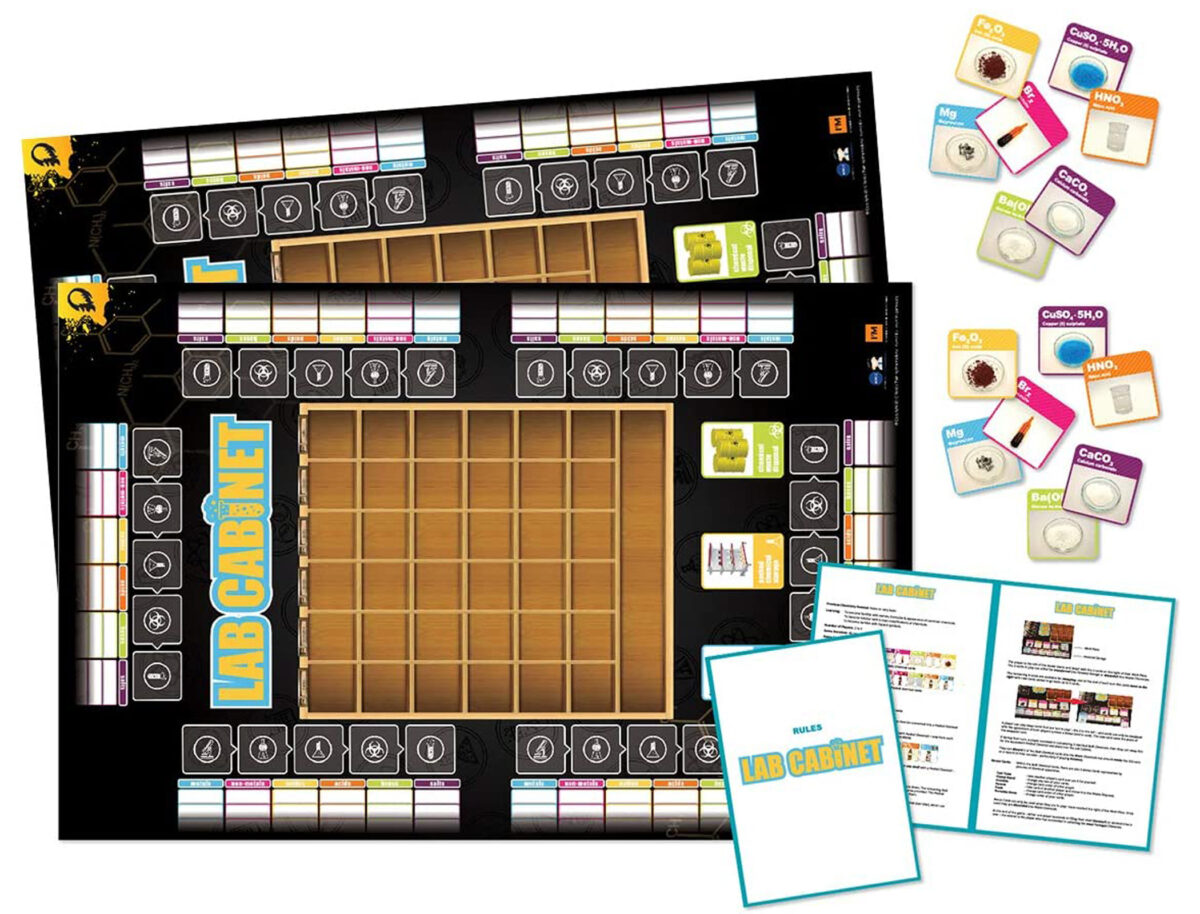
2-6 Players | Age 14-17 | For Schools
Lab Cabinet is a game designed to help familiarize the players with elements and their formulas and appearance. Players attempt to pack their lab cabinet with certain elements or chemicals. The main mechanism for this is communication and negotiation.
is a game designed to help familiarize the players with elements and their formulas and appearance. Players attempt to pack their lab cabinet with certain elements or chemicals. The main mechanism for this is communication and negotiation.
The game focuses on 6 types of elements & chemicals: Metals, Non-metals, Acids, Oxides, Salts, Bases.
It also teaches hazard symbols of lab safety, making this game excellent for a beginning chemistry course.
The game duration is between 45-60 minutes making it an ideal game to play in a classroom setting. However, I would not recommend this game for home use just because it might get boring if played over and over again. It really is meant to teach students some of the basics, once they move past that this game will lose its appeal.
Acids and Their Salts (I’M)
★★★☆☆
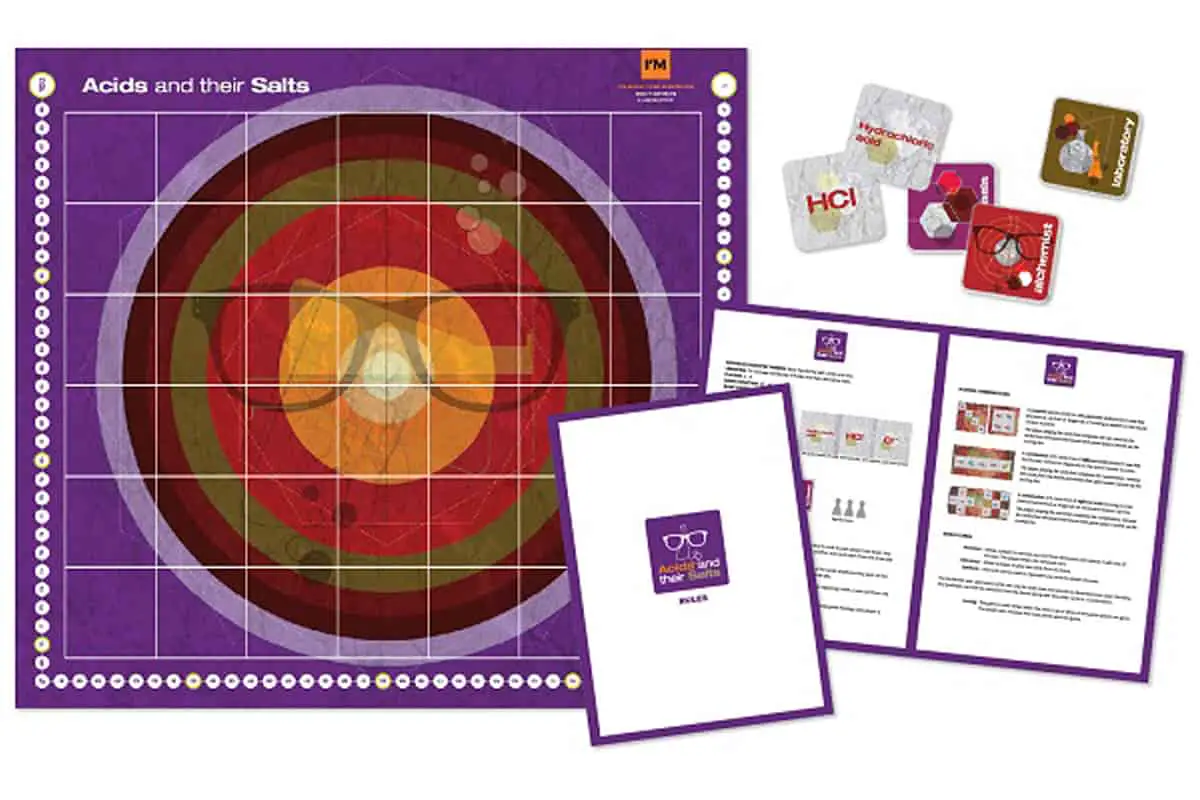
2-8 Players | Age 13-17 | For Schools
Acids and Their Salts helps students to learn all about acids and their derivative salts. Students will learn the names of acids, their chemical formula, derivative salts and their names, and acid residues. Gameplay for Acids and Their Salts is short, around 30 minutes.
helps students to learn all about acids and their derivative salts. Students will learn the names of acids, their chemical formula, derivative salts and their names, and acid residues. Gameplay for Acids and Their Salts is short, around 30 minutes.
I would recommend this game for science teachers but not for families. It is a good tool to teach the specific concept of acids and related salts, however, this is a very narrow scope for a family game. However, I could easily see it in the high school chemistry teacher’s repertoire.
All of the information that students learn from this game is highly accurate, the gameplay is quick moving. Students attempt to create combinations of acid cards to score points. To enhance the quick pace students are limited to 1 minute of think time to make a choice. I could see this being used as an end of class activity, or a study review for a test on acid reactions.
Mendeleyev’s Dream (I’M)
★★★☆☆
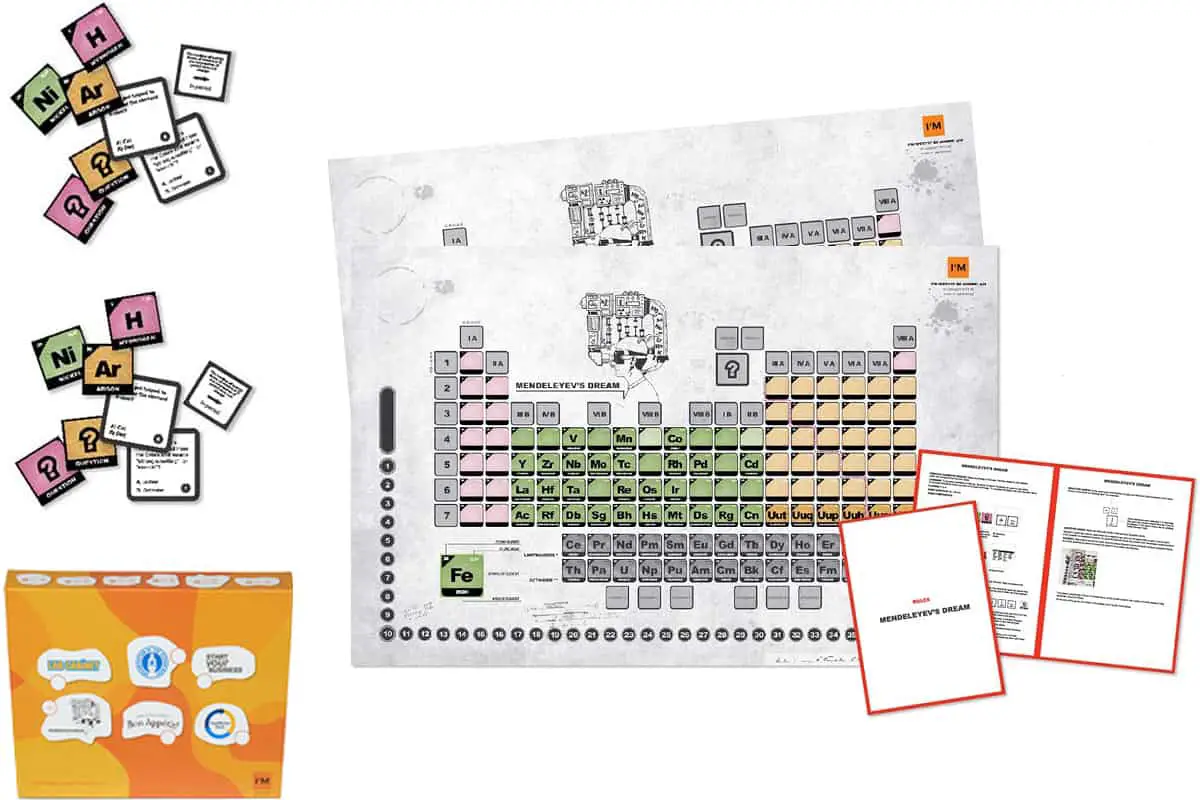
2-6 Players | Age 12-14 | For Schools
In Mendeleyev’s Dream students learn about the name, symbol, and atomic number of the elements, along with other fun facts and pieces of trivia. Additionally, this game also covers chemical groups and periods on the Periodic Table.
students learn about the name, symbol, and atomic number of the elements, along with other fun facts and pieces of trivia. Additionally, this game also covers chemical groups and periods on the Periodic Table.
This game is designed for middle school and would best be used as supplementary material for classroom learning. Gameplay lasts 45 minutes, which is perfect for a science class. Players use cards to travel around the period table and place their elements in the correct spot. Players get bonuses for answering questions regarding the elements.
Chemistry Mastery Game (NewPath Learning)
★★★★★
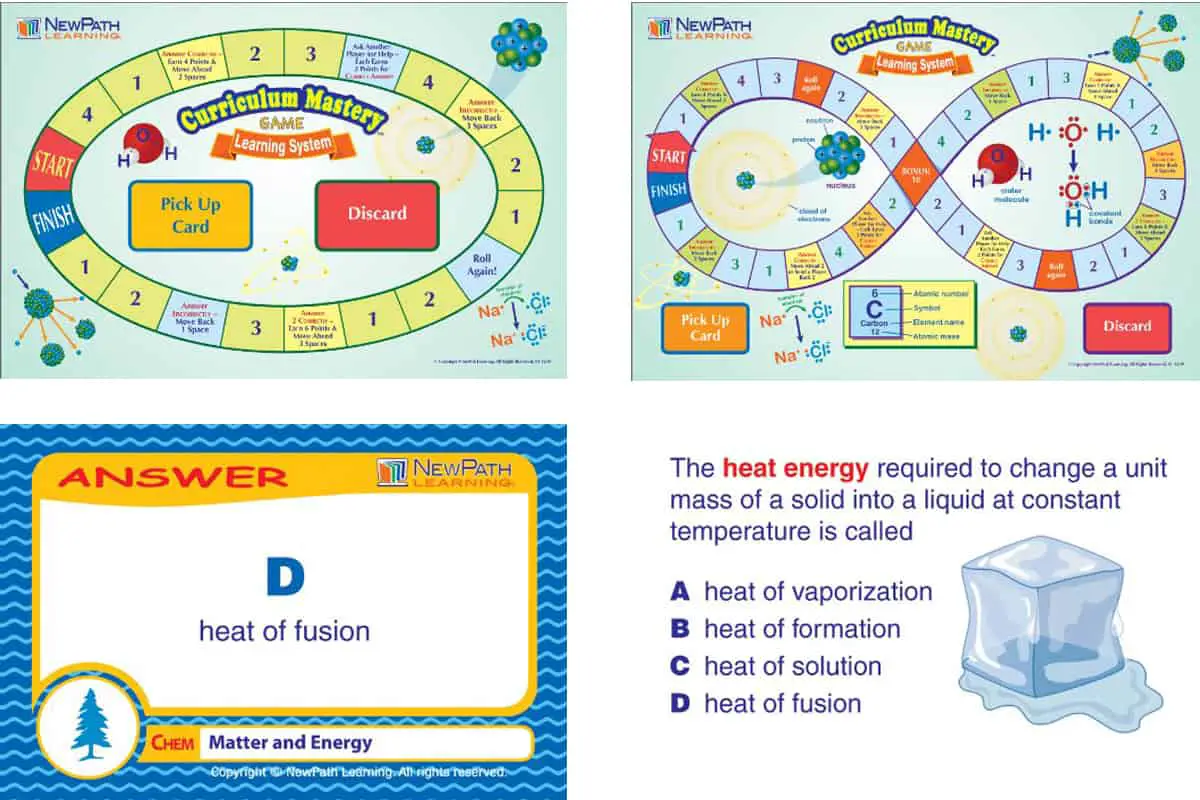
2-36 Players | Age 14-18 | For Schools
Chemistry Mastery Game is a class set of chemistry curriculum review. Chemistry Mastery Game is designed to be used in class and can be used as a whole class with 12 laminated game cards included. For a teacher, this game could be an invaluable review for tests, difficult concepts, or just as a follow-up lesson to reinforce concepts.
is a class set of chemistry curriculum review. Chemistry Mastery Game is designed to be used in class and can be used as a whole class with 12 laminated game cards included. For a teacher, this game could be an invaluable review for tests, difficult concepts, or just as a follow-up lesson to reinforce concepts.
This game covers essentially a whole year of high school chemistry, covering a wide range of topics including:
- States of Matter
- Atomic Structure / Elements / The Periodic Table
- Chemical Formulas and Bonding / Equations / Reactions / Compounds
- Solutions / Gases
- Acids, Bases and Salts
- Oxidation, Reduction and Electrochemistry
- The Chemistry of Life
- Nuclear Chemistry
In addition to the game, teachers also get access to a one-year subscription of NewPath’s Online Learning Program. This gives the educator access to lessons, videos, online games, quizzes, labs, and more. I very highly recommend it for the high school chemistry teacher.
CompoundIt!
★★★★☆
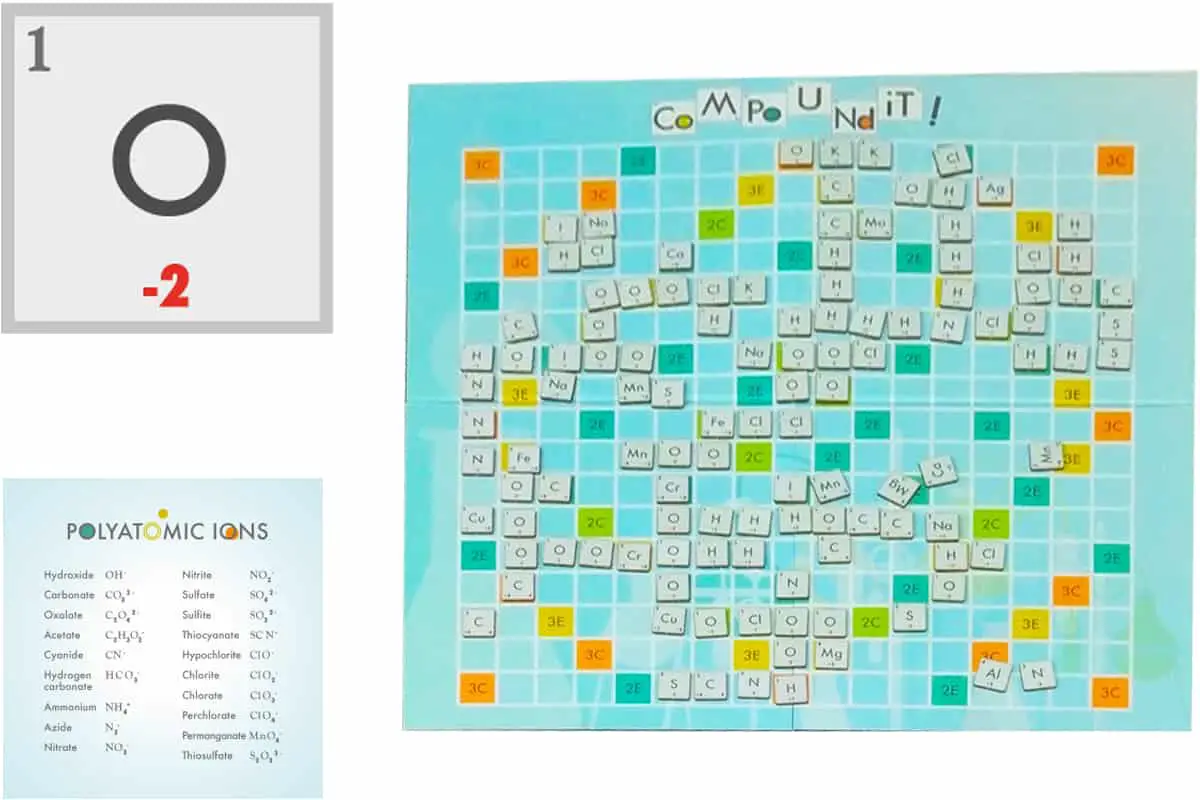
2-6 Players | Age 12+ | For Families | Author: Andrew Lyman-Buttler
CompoundIt ! is played exactly like Scrabble, but instead of using words, players create compounds. It does not take a ton of background information or knowledge to play, however, the more you know the more fun this game will be. The game also includes polyatomic ions and has specific rules for playing these on the board.
! is played exactly like Scrabble, but instead of using words, players create compounds. It does not take a ton of background information or knowledge to play, however, the more you know the more fun this game will be. The game also includes polyatomic ions and has specific rules for playing these on the board.
Just like in Scrabble, there are double word and double letter bonuses, only in this game they are double compound and double element bonuses. I believe this game would be a fun way to understand how compounds work and how ions bond together.
The following video is a complete review and tutorial:
Printable Chemistry Board Games
If you are looking for a cheaper option for learning or reviewing chemistry concepts these printable games are a good option if you do not want to spend 30-50 dollars on a board game.
Chemistry (EzPz-Science)
★★★☆☆
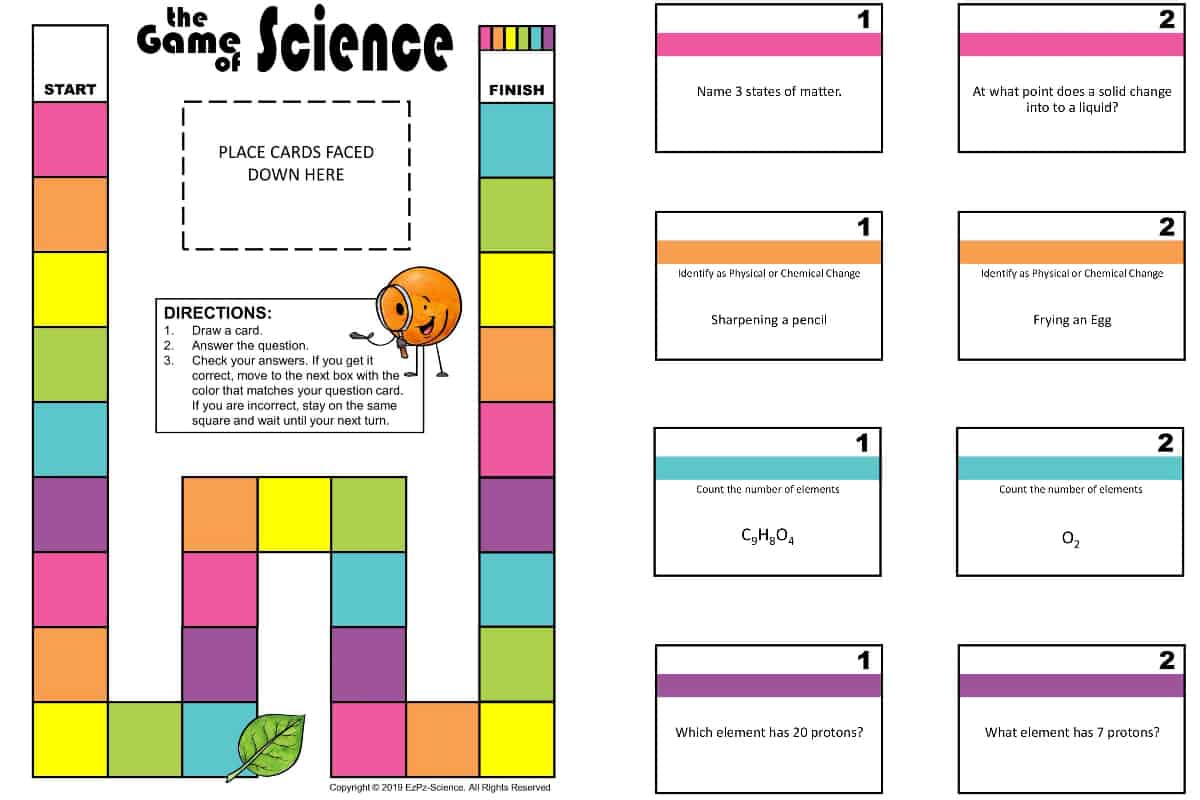
2-30 Players | Age 10-13 | Cost: $5.00 | For Schools
Chemistry is a fun board game that can be played in small teams, as a whole class, or even just presented as a trivia contest. Flexibility is the key with this game. Topics covered are as follows:
is a fun board game that can be played in small teams, as a whole class, or even just presented as a trivia contest. Flexibility is the key with this game. Topics covered are as follows:
- Matter
- Physical & Chemical Changes
- Atoms / Elements / Compounds
- Counting Atoms and Elements
- Periodic Table
Chemistry Final Exam Review (Teamwork Toolbox)
★★★★☆
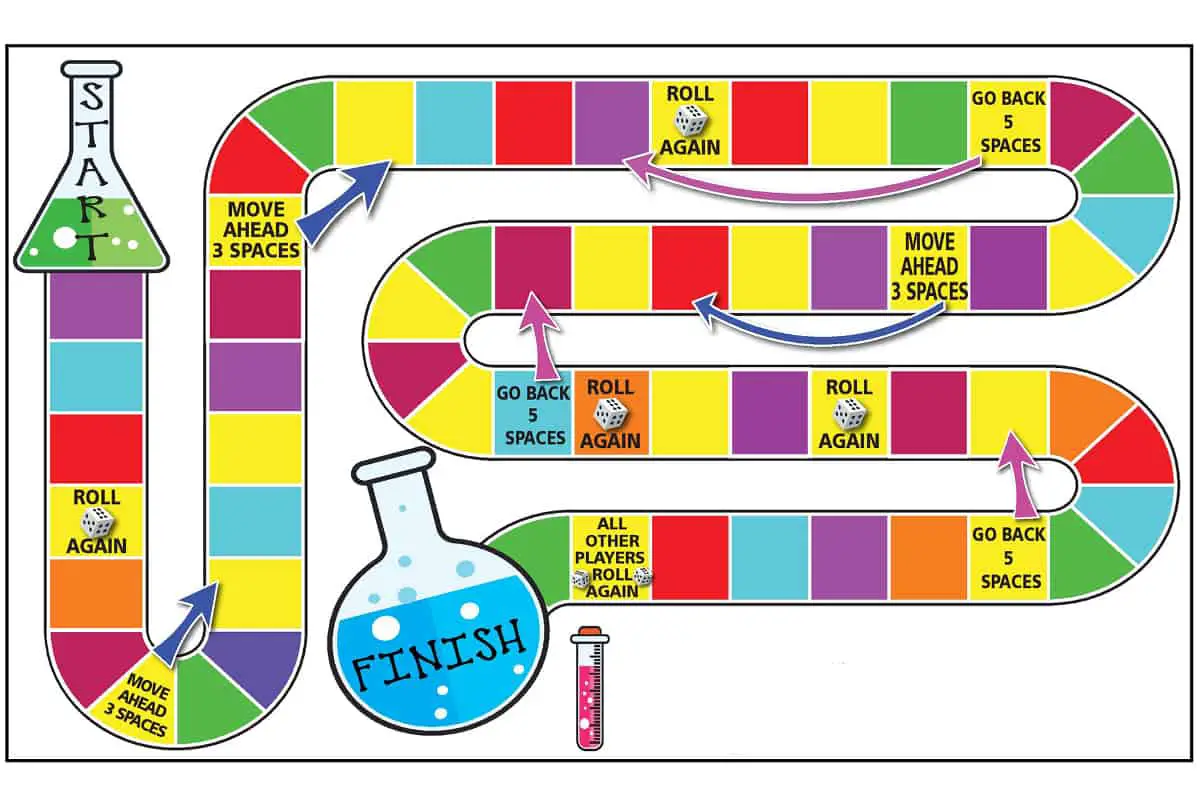
2-36 Players | Age 14-18 | Cost: $3.50 | For Schools
Just as the title suggests, Chemistry Final Exam Review is a standards based review for a final examination in chemistry. The game is unique because it can be completely paperless. This is good because it saves resources, however, you will need a laptop per group to play the game effectively. You can also print out the gameboard and questions instead.
is a standards based review for a final examination in chemistry. The game is unique because it can be completely paperless. This is good because it saves resources, however, you will need a laptop per group to play the game effectively. You can also print out the gameboard and questions instead.
The gameplay is a series of questions ranging in difficulty that students must answer. They are given different amounts of time to answer different questions. As students answer questions their group moves around the game board creating a sense of collective competition. The instructor can edit questions to fit their needs, making this a great option for teachers.
Chemistry (Kesler Science)
★★★★★
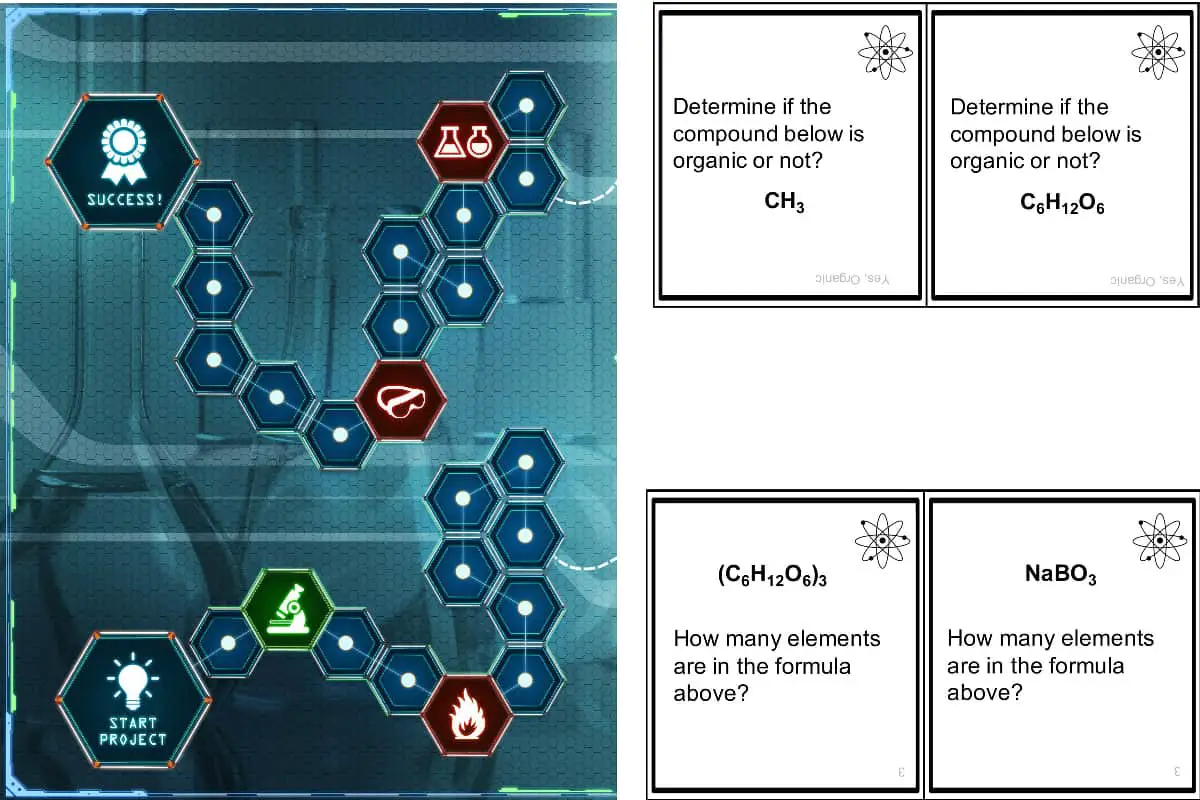
2+ Players | Age 10-13 | Cost: $7.00 | For Schools
Chemistry is a simple board game that can be played in small groups or used to review in larger teams. It includes a game board, multiple-choice cards, open-ended question cards, and even blank cards for teachers to develop their own questions.
is a simple board game that can be played in small groups or used to review in larger teams. It includes a game board, multiple-choice cards, open-ended question cards, and even blank cards for teachers to develop their own questions.
The game is a comprehensive review including the following topics:
- Atomic Structure
- Counting Atoms & Elements in Chemical Formulas
- Law of Conservation of Mass
- Reactants and Product
- Elements Identity
- Valence Electrons
- Reactivity
- Periodic Table Trends (groups and periods)
- Physical and Chemical Changes in Digestion
- Evidence of Chemical Change
- Organic Compounds
- Balanced Equations
- Elements and Compounds
- Metals, Nonmetals, Metalloids
- Calculating Density
For just 7 bucks, this really is a tremendous value for the classroom teacher. I highly recommend it!
Other Types of Chemistry Games
In addition to the board games and printables related to chemistry, there are also a variety of puzzles such as’ EuroGraphics’ “Periodic Table Puzzle ” and lab kits like UNGLINGA’s “Kids Science Experiment Kit
” and lab kits like UNGLINGA’s “Kids Science Experiment Kit ”. While these are not games, per se, they do allow students to engage in learning chemistry at home in a hands-on way. There are even chemistry playing cards such as SynHeme’s “Periodic Table Playing Cards
”. While these are not games, per se, they do allow students to engage in learning chemistry at home in a hands-on way. There are even chemistry playing cards such as SynHeme’s “Periodic Table Playing Cards ” that have the different elements on them and can be a very useful aid to learn them.
” that have the different elements on them and can be a very useful aid to learn them.
Edudingo.com is a participant in the Amazon Services LLC Associates Program, an affiliate advertising program designed to provide a means for sites to earn advertising fees by advertising and linking to Amazon.com. We also participate in other affiliate programs which compensate us for referring traffic.
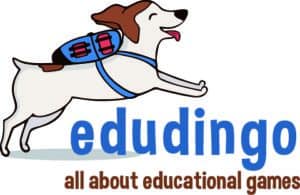
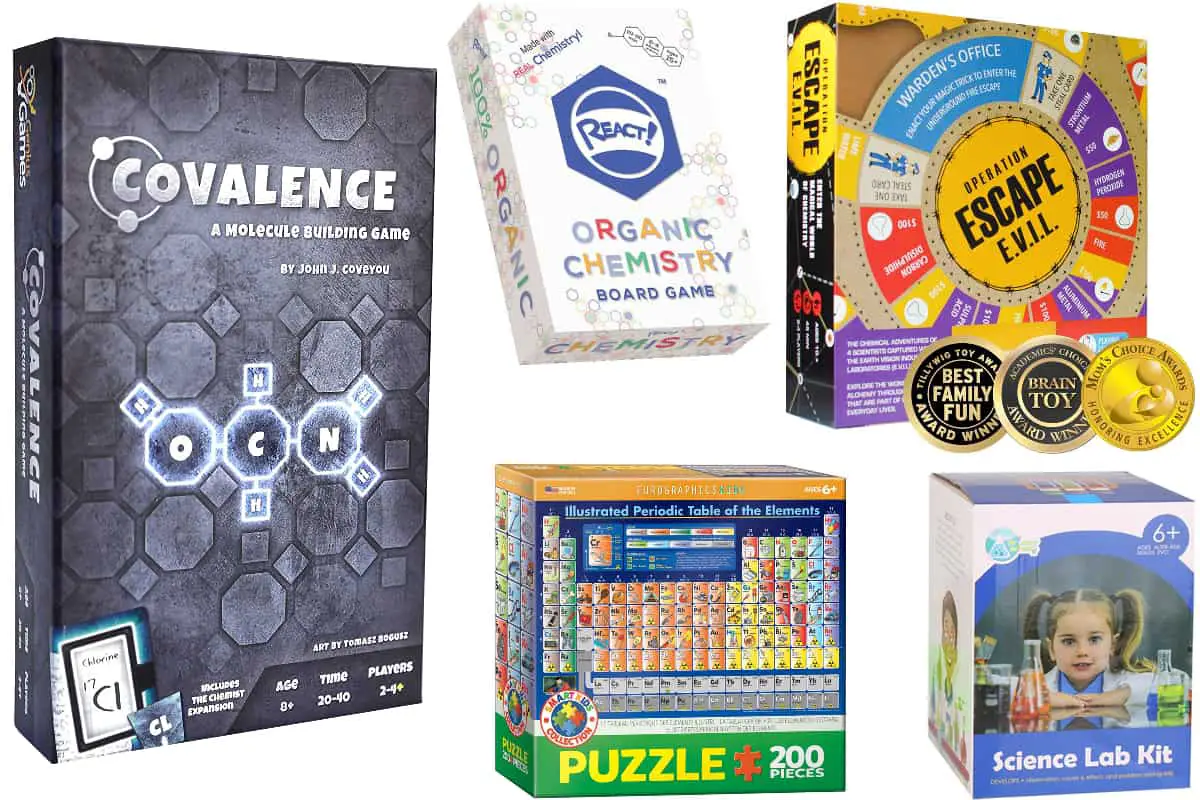
hey! my name is João Vitor, i am 20, from brazilian. I am studying chemical engineering at a federal university. When i was studying chemistry technician, i created a very good game. Could you give me informational assistance on how i can make him achieve “fame”? I do know if that is the right word, however, i wanted to get a sponsorship, something like. Can you help me?
Hi João,
You have basically two possibilities to introduce your game to its target market.
You can edit it yourself, in which case you become a publisher and will be:
– Working with an illustrator & a printer to produce the game
– looking for a distributor to sell it or sell it directly
You can search a publisher which will edit, produce and sell your game.
I do not know about educational game publishers in Brazil, so I might not be the best person to give advice on which publishers you would want to contact though…
Kind regards
François